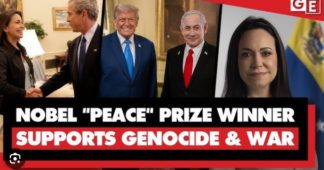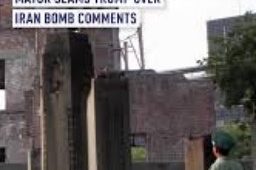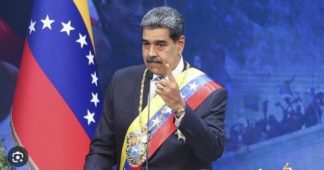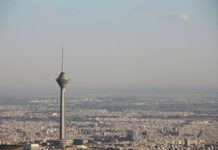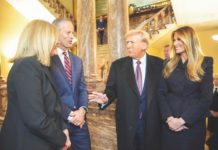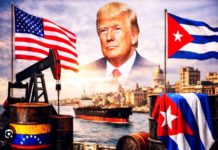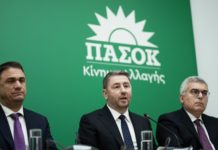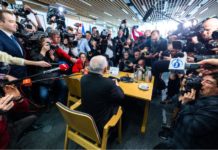Jeet Heer
Oct 13, 2025
Trump is mad that he didn’t win. But by honoring María Corina Machado, the Nobel Committee has endorsed his war against Venezuela—and continued Europe’s MAGA groveling.
Donald Trump’s narcissism is truly a force of nature—a black hole that consumes everything around it and can never be filled. His neediness is insatiable: No amount of groveling praise can ever be effusive enough, no defeat of his political enemies total enough, and no worldly achievement can ever allow him a moment of satisfaction. Now, having twice won the presidency, Trump set his eyes on a new prize, one all the more desirable because, like the title of commander in chief, it was also once held by Barack Obama: the Nobel Peace Prize.
On Thursday, The Wall Street Journal reported that Trump has “fixated on the prize” and openly lobbied for it for months, his hunger so naked that “domestic supporters and international leaders seeking his favor have joined him in a vociferous campaign.” Trump claimed he deserved the prize because he “solved eight wars in a period of nine months.” (In a twist that will shock no one, it turns out that this is not true.) And it’s widely rumored that part of the reason Trump engineered a ceasefire between Israel and Hamas was to have the deal sewn up in time for a last-minute award in this year’s Nobels.
But on Friday, Trump got the disappointing news that he’d been snubbed. Instead, the prize went to María Corina Machado, a Venezuelan politician who has challenged the autocratic regime of her country’s president, Nicolás Maduro. Some in the White House couldn’t hide their bitterness. White House communications director Steven Sheung grumbled, “The Nobel Committee proved they place politics over peace.” Richard Grenell, Trump’s envoy to Venezuela, sneered, “Nobel Prize died years ago.”
These scoffing words are exceptionally shortsighted. While Trump’s winning the Peace Prize would’ve been the best outcome for the White House, Machado was the second-best possible result. Nor was it a small consolation prize.
Over the past two months, the Trump administration has become increasingly belligerent towardsVenezuela, repeatedly attacking Venezuelan boats with the unproven (and legally irrelevant) claim that they were smuggling drugs. Every indication is that the United States is preparing for a regime-change war. Machado’s Nobel Peace Prize, ironically, makes this pending war more likely.
A New York Times headline captured the irony: “Peace Prize Winner Has Supported Trump’s Military Actions in the Caribbean.” To the famous Orwellian slogan “War is peace” we can now add a new variation: “Peace Prize justifies war.”
Machado’s prize can be seen as both a product of Trump administration diplomacy and a greenlight for war. Last fall, Trump’s Secretary of State Marco Rubio, then a senator, signed a letter nominating Machado for the Nobel Peace Prize. The letter was signed by seven Republican lawmakers, including Michael Waltz, who is now the US ambassador to the United Nations after a contentious and brief term as Trump’s national security adviser. These Republicans supported Machado because she fundamentally shares their vision of counterrevolution and neoliberal restoration in Venezuela. Among other policies, she’s committed to privatizing the nation’s immense oil reserves.
Upon winning the prize, Machado cannily posted on the social media site X that she wanted to “dedicate this prize to the suffering people of Venezuela and to President Trump for his decisive support of our cause!” Speaking on Fox News on Friday, Machado said Trump “deserves” the prize for his self-proclaimed efforts in ending eight wars and championing of democracy in Venezuela.
Machado’s brand of democracy promotion, reliant as it is on US military intervention, deserves skepticism. Speaking on Democracy Now! on Friday, Yale historian Greg Grandin described her winning of the Nobel as a “really a shocking choice.” Grandin noted that Machado supported a coup against democratically elected President Hugo Chávez in 2002. Her hard-line position on economic matters has both hampered and divided the anti-Maduro coalition. And the fact that she’s praised both the bombing of Venezuelan boats and welcomed further American interventions into Venezuela is likely to strengthen Maduro’s hold on power, since it vindicates his claim that the opposition is filled with US puppets. Grandin also pointed out that if the Nobel committee had wanted to legitimize the anti-Maduro opposition, they could’ve given the award to feminist leaders who are both critics of the regime and oppose US intervention.
Aside from currying the support of Trump, Machado has repeatedly sought out alliances with authoritarian leaders such as El Salvador’s El Nayib Bukele, Brazil’s Jair Bolsonaro, and Israel’s Benjamin Netanyahu. In February, she was a virtual participant in a conference in Madrid called Patriots of Europe, a meeting of far-right groups steeped in racism.
The danger of Machado’s victory is that she can now use her prestige as a Nobel Peace Prize winner to organize mainstream support for a regime-change war. Notably, the awarding of the prize has drawn praise from Barack Obama and in the pages of The Washington Post. Centrist liberals, already reluctant to criticize Trump’s bombing campaign against Venezuelan boats, are likely to be even more cowed now. As with George W. Bush’s invasion of Iraq, a bipartisan consensus could support regime change in Venezuela. The imprimatur of the Nobel Peace Prize will make such a war more likely.
Machado’s Nobel Peace Prize falls into a larger pattern of European elites aligning themselves with Trump’s foreign policy. Trump’s America First rhetoric and trade war threats seems to have scared NATO allies. In theory, this fear could have led the European ruling class to work toward a more independent, post-American foreign policy. In practice, the Europeans have chosen instead to grovel as much as possible in hope of winning Trump’s favor.
As Martin Sandu noted in the Financial Times in August,
When Trump returned to the White House, European leaders seemed unconvinced as to how to handle him. By now, their strategic choice is evident. It is accommodation rather than confrontation, accompanied by flattering rhetoric noisily praising Trump’s peace- and dealmaking prowess. The question is whether the loss in self-respect has been worth it. Speak to those close to the decision-making, and the refrain is that “no one is being naive here”. Instead, the plea is pragmatism.
On issue after issue, whether it is trade or military expenditure, European leaders have caved to Trump. This submissive policy has not had the desired effect of moderating Trump. Rather, it has just emboldened him, because his hunger for displays of domination is limitless. If Trump does rush into another war, European allies will be his willing accomplices.
Trump is foolish to think he needs to win the Nobel Peace Prize. He has all the power and glory he could want, because the people who could theoretically stop him have decided to surrender.
